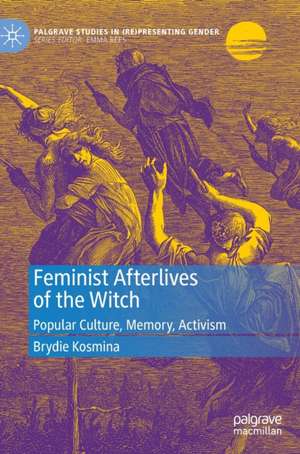Feminist Afterlives of the Witch: Popular Culture, Memory, Activism: Palgrave Studies in (Re)Presenting Gender
Autor Brydie Kosminaen Limba Engleză Hardback – apr 2023
| Toate formatele și edițiile | Preț | Express |
|---|---|---|
| Paperback (1) | 628.03 lei 38-45 zile | |
| Springer International Publishing – 2 apr 2024 | 628.03 lei 38-45 zile | |
| Hardback (1) | 699.28 lei 6-8 săpt. | |
| Springer International Publishing – apr 2023 | 699.28 lei 6-8 săpt. |
Preț: 699.28 lei
Preț vechi: 822.68 lei
-15% Nou
Puncte Express: 1049
Preț estimativ în valută:
133.80€ • 139.70$ • 110.74£
133.80€ • 139.70$ • 110.74£
Carte tipărită la comandă
Livrare economică 04-18 aprilie
Preluare comenzi: 021 569.72.76
Specificații
ISBN-13: 9783031252914
ISBN-10: 3031252918
Pagini: 262
Ilustrații: XV, 262 p. 1 illus.
Dimensiuni: 148 x 210 mm
Greutate: 0.49 kg
Ediția:2023
Editura: Springer International Publishing
Colecția Palgrave Macmillan
Seria Palgrave Studies in (Re)Presenting Gender
Locul publicării:Cham, Switzerland
ISBN-10: 3031252918
Pagini: 262
Ilustrații: XV, 262 p. 1 illus.
Dimensiuni: 148 x 210 mm
Greutate: 0.49 kg
Ediția:2023
Editura: Springer International Publishing
Colecția Palgrave Macmillan
Seria Palgrave Studies in (Re)Presenting Gender
Locul publicării:Cham, Switzerland
Cuprins
Chapter 1: Witch: A Feminist Memory.- Chapter 2: Witches and the Past.- Chapter 3: Witches and the Present- Chapter 4: Witches as Monsters.- Chapter 5: Witches as Lovers.- Chapter 6: Witches as Mothers.- Chapter 7: Witches as Girls.- Chapter 8: Witches and the Future.
Notă biografică
Brydie Kosmina is a Visiting Research Fellow at the University of Adelaide, Australia, in Tarndanya/Adelaide. Her research covers feminist memory, politics and popular culture, and the environmental humanities, particularly nuclear studies. She teaches and lectures in literary, screen and cultural studies. Brydie is a Postgraduate and Early Career Researcher Representative to the Cultural Studies Association of Australasia, and works as an editor, writer and reviewer for indie arts and culture website Collage Adelaide.
Textul de pe ultima copertă
"Brydie Kosmina’s book is a smart, topical study of the figure of the witch in contemporary culture, sensitive and thought-provoking in its approach and written with flair and passion."
--Professor Marion Gibson, University of Exeter, Devon UK.
The book investigates the witch as a key rhetorical symbol in twentieth- and twenty-first century feminist memory, politics, activism, and popular culture. The witch demonstrates the inheritance of paradoxical pasts, traversing numerous ideological memoryscapes. This book is an examination of the ways that the witch has been deployed by feminist activists and writers in their political efforts in the twentieth century, and how this has indelibly affected cultural memories of the witch and the witch trials, and how this plays out in popular culture representations of the symbol through the twentieth and twenty-first centuries. Consequently, this book considers the relationship between popular culture and media,activist politics, and cultural memory. Using hauntological theories of memory and temporality, and literary, screen, and cultural studies methodologies, this book considers how popular culture remembers, misremembers, and forgets usable pasts, and the uses (and misuses) of these memories for feminist politics. Given the ubiquity of the witch in popular culture, politics and activism since 2016, this book is a timely examination of the range of meanings inherent to the figure, and is an important study of how cultural symbols like the witch inherit paradoxical memories, histories, and politics. The book will be valuable for scholars across disciplines, including witchcraft studies, feminist philosophy and history, memory studies, and popular culture studies.
Brydie Kosmina is a Visiting Research Fellow at the University of Adelaide, Australia, in Tarndanya/Adelaide. Her research covers feminist memory, politics and popular culture, and the environmental humanities, particularly nuclear studies. She teaches and lectures in literary, screen and cultural studies. Brydie is a Postgraduate and Early Career Researcher Representative to the Cultural Studies Association of Australasia, and works as an editor, writer and reviewer for indie arts and culture website Collage Adelaide.
--Professor Marion Gibson, University of Exeter, Devon UK.
The book investigates the witch as a key rhetorical symbol in twentieth- and twenty-first century feminist memory, politics, activism, and popular culture. The witch demonstrates the inheritance of paradoxical pasts, traversing numerous ideological memoryscapes. This book is an examination of the ways that the witch has been deployed by feminist activists and writers in their political efforts in the twentieth century, and how this has indelibly affected cultural memories of the witch and the witch trials, and how this plays out in popular culture representations of the symbol through the twentieth and twenty-first centuries. Consequently, this book considers the relationship between popular culture and media,activist politics, and cultural memory. Using hauntological theories of memory and temporality, and literary, screen, and cultural studies methodologies, this book considers how popular culture remembers, misremembers, and forgets usable pasts, and the uses (and misuses) of these memories for feminist politics. Given the ubiquity of the witch in popular culture, politics and activism since 2016, this book is a timely examination of the range of meanings inherent to the figure, and is an important study of how cultural symbols like the witch inherit paradoxical memories, histories, and politics. The book will be valuable for scholars across disciplines, including witchcraft studies, feminist philosophy and history, memory studies, and popular culture studies.
Brydie Kosmina is a Visiting Research Fellow at the University of Adelaide, Australia, in Tarndanya/Adelaide. Her research covers feminist memory, politics and popular culture, and the environmental humanities, particularly nuclear studies. She teaches and lectures in literary, screen and cultural studies. Brydie is a Postgraduate and Early Career Researcher Representative to the Cultural Studies Association of Australasia, and works as an editor, writer and reviewer for indie arts and culture website Collage Adelaide.
Caracteristici
Analyses feminist rhetoric alongside popular culture texts to consider cultural meanings of the witch as mnemonic symbol Draws on memory studies frameworks to analyse cultural symbols and historical narratives of the witch trials Uses hauntological temporalities to consider the relationship between feminist memory and popular culture and media












